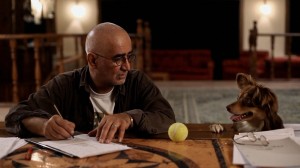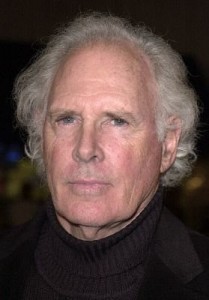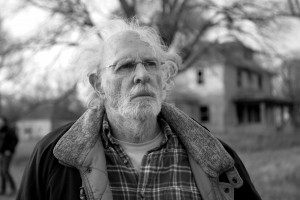AFI Fest, the American Film Institute’s annual film festival, continues at the Chinese Theatre in Hollywood. The Daily Bruin’s Sebastian Torrelio and Tony Huang are attending until the festival’s close on Thursday, screening several of the biggest films being put up for audience award consideration and otherwise. On the third day of AFI Fest, Huang went on an independent journey, which included the limited piece “Closed Curtain” and the red carpet premiere gala for “Nebraska.” The latter opened by a tribute to the film’s lead actor, Bruce Dern.
 [media-credit name=”Jafar Panahi Film Productions” align=”left” width=”300″]
[media-credit name=”Jafar Panahi Film Productions” align=”left” width=”300″]
“Closed Curtain”
Directed by Jafar Panahi and Kambuzia Partovi
Jafar Panahi Film Productions
“Closed Curtain” is Iranian director Jafar Panahi’s second illegal production (after 2011’s “This Is Not a Film”) since he was banned from making films and leaving Iran in 2010. Set entirely in Panahi’s house, the film is ostensibly a fictional feature about a solitary writer and his dog, though the narrative gradually turns self-reflexive as the reality of Panahi’s situation starts to creep into the proceedings. It’s a deeply depressing film, infused with anxiety over the filmmaker’s situation – in a sense, it implodes, hitting limitations built into the structure of a house-arrest film.
In fact, much of the deep melancholy of the film arises from the apparent fact that Panahi himself is understandably depressed. About halfway through the film, a mysterious female suddenly appears in the house, challenging the writer with declarations of suicidal intent. It becomes clear that she and the writer are two conflicting forces in Panahi’s mind: the artist attempting to create against all odds versus the man feeling that the odds are too great, and that oblivion might be preferable.
This is evidently deeply disturbing – some parts of the film could probably be used as a video suicide note. But Panahi isn’t just expressing forlornness. There’s still a filmmaker’s playfulness, an eager explorer looking for opportunities for aesthetic pleasure even in such dire circumstances. The opening scene, for instance, where the writer draws up all the curtains, is clearly the work of someone still puzzling over the art of cinema. The closing scene, however, is clearly the work of a man who wants to express that art outside of his confines.
 [media-credit name=”American Film Institute” align=”left” width=”209″]
[media-credit name=”American Film Institute” align=”left” width=”209″]
Bruce Dern Tribute
Before “Nebraska” played, AFI Fest hosted a Q&A tribute to veteran actor Bruce Dern, who stars in the film. Quentin Tarantino introduced the actor with typical exuberance, giving a passionate account of what it means to ask for “Dernsies” – that is, moments that only Dern could make good. Dern then walked on stage to talk with Leonard Maltin, who asked questions about Hollywood old and new and about the various people Dern has worked with.
Dern turned out to be an incredibly affable personality, speaking about his experiences of playing bit parts with wit and grace. Especially memorable is his goal to be “the most interesting cowboy No. 4 from the right” on screen – indeed, for many actors, having a credible presence on screen is the most difficult task of all. Dern was especially gracious with his praise for “Nebraska” director Alexander Payne and repeatedly thanked Payne for casting him. He also waxed nostalgic on his work with Elia Kazan, who taught him acting, and on his work with Hal Ashby – he especially insisted that Ashby was “something else,” and Dern’s enthusiasm for the director’s work was palpable and infectious.
The Q&A ended with two anecdotes – one about John Wayne, the other about Alfred Hitchcock. The one about Hitchcock is especially enlightening: Apparently, after the first day of shooting on “Family Plot,” Hitchcock walked up and thanked every single member of the 63-person crew by name. This seems somewhat contradictory to Hitchcock’s domineering reputation. Dern appeared delighted to share this with the audience, and again sincerely thanked Payne (who later repaid the compliment by calling Dern a screen legend), before he walked off for the movie to start. The audience gave him a long standing ovation.
 [media-credit name=”Paramount Pictures” align=”left” width=”300″]
[media-credit name=”Paramount Pictures” align=”left” width=”300″]
“Nebraska”
Directed by Alexander Payne
Paramount Pictures
“Nebraska,” the latest feature from American director Alexander Payne, is likely to be a somewhat divisive movie. Payne is famous (or infamous) for his raw, harsh caricatures of ridiculous characters, to the point where accusations of condescension and cruelty are always leveled against him, to varying degrees of validity.
The charges seem to be ready-made for his latest film, which follows stubborn old man Woody Grant (Bruce Dern) and his son David Grant (Will Forte) as they travel to Lincoln, Neb. to pick up a bogus million-dollar sweepstakes award. Most of the movie winds up happening in Hawthorne, where Woody grew up and where a lot of the Grant family still lives. Colorful midwestern characters abound, a lot of them caught in their own delusions – especially Woody, who just won’t admit that the prize is fake.
Shot in gorgeous black and white cinemascope, the film keeps a curious tone, perched between drama and comedy, liable to wield either at will. Although the characters do tend to be broad – June Squibb’s grandmother role is a good performance wasted on a bad character – the core of the movie, that is the father-son relationship and the vaguely hostile relationship to family and hometown, is treated with immense tenderness and empathy.
The second half especially aims straight for the gut – Payne’s amazingly precise, somewhat nostalgic visuals (What other modern filmmaker uses wipes?) evoke both regret and forgiveness, lending the film’s uncommunicative family men a certain grace even as they stumble through life. “Nebraska” is an elegant film about inelegant people, seemingly broad but surprisingly delicate.
